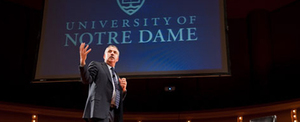‘Flat Earth’ Friedman says financial crisis was a ‘warning heart attack’
Published: November 3, 2010 / Author: Ed Cohen

When historians look back at the financial crisis of 2007-08, they won’t view it as just a financial crisis, New York Times columnist Thomas Friedman told an audience at Notre Dame.
“They’re going to say this was the moment when the market and Mother Nature said, ‘This is your warning heart attack. You are growing in an unsustainable way. Turn back now.’”
Friedman’s talk, Nov. 4 in the Leighton Concert Hall of the DeBartolo Performing Arts Center, was a signature event of the year-long Notre Dame Forum on The Global Marketplace and Common Good.
The Pulitzer Prize-winning author of The World is Flat: A Brief History of the Twenty-First Century and Hot, Flat, and Crowded: Why We Need a Green Revolution—and How It Can Renew America, Friedman discussed the economic playing field leveled by globalization. But he spent much of his talk lamenting what he called unsustainable economic and environmental policies and ethics.
Friedman said the “warning heart attack” was the inevitable result of a business cycle that consisted of Americans “building more and more houses and more and more stores so we could buy more and more stuff to be made in more and more Chinese factories powered by more and more coal so they could earn more and dollars to buy more and more T-bills to be recirculated back to America, so we could build more and more houses and more and more stores…” ad infinitum.
That loop was not sustainable, he said. And neither is society’s abandonment of traditional values such as long-term thinking in favor of “situational values” by which people ignore future consequences of their actions for immediate gain. Especially if at that future date “IBG” (I’ll Be Gone) or “YBG” (You’ll Be Gone), he said.
He gave the example of home mortgages during the housing bubble. Banks approved loans well beyond buyers’ means. Buyers took advantage of no-money-down, no-payments mortgages, only to walk away when the freebies expired. The investment industry packaged these mortgages into dubious financial instruments.
Everyone made out in the short-term it, but it led to a painful day of reckoning. The same dynamic applies to those who ignore the future perils of climate change, he said.
Friedman said the so-called Greatest Generation (World War II) left a country of abundance and freedom because of the values its members lived by: honesty, integrity, transparency, long-term thinking. But baby boomers became the Grasshopper Generation and “ate through the abundance.”
Speaking to an audience made up mostly of college students, he said it would be up to the generation now coming of age to become the “Re-Generation” and restore sustainable values.
“[I]f we don’t do this, friends, we are really in trouble.”
Friedman’s talk was followed by a roundtable discussion involving Friedman; Carolyn Woo, the Martin J. Gillen Dean of the Mendoza College of Business; Gary Anderson, Hesburgh Professor of Catholic Theology; and Shanna Gast (ND ’11), an economics major. Norah O’Donnell, chief Washington correspondent for NBC News’ 24-hour cable channel, MSNBC, moderated.
Other topics Friedman addressed included:
- Development of clean-energy technologies – He said he’d like to see an Earth Race akin to the Space Race of the 1950s and ’60s with the United States taking the lead again.
- China – He said Chinese friends sometimes accuse him of exaggerating China’s accomplishments and prospects. His response: “You’re my Sputnik.” Just as the Soviet satellite scared the United States into developing a space program, he hopes China’s economic explosion rouses American society to collective action.
- Decline in school achievement – Ninety-five percent of it is poor parenting, said the journalist whose wife and daughter are teachers. Children from stable, nurturing environments come to school ready and able to learn.
- Influence of the Internet – He said parents need to protect their children from the abundance of unfiltered material by “building in” strong ethics. Modems (devices for connecting a computer to the Internet), he said, ought to come with a warning label: “Judgment not included.”
Established in 2005 by Rev. John I. Jenkins, CSC, Notre Dame’s president, the Notre Dame Forum has brought leading authorities to campus to discuss substantive issues of the day. Past forum topics have included immigration, sustainability, global health and the role of religious faith in a plural world.
/news_and_events/news_articles/article/7895/flat-earth-friedman-says-financial-crisis-was-a-warning-heart-attack




